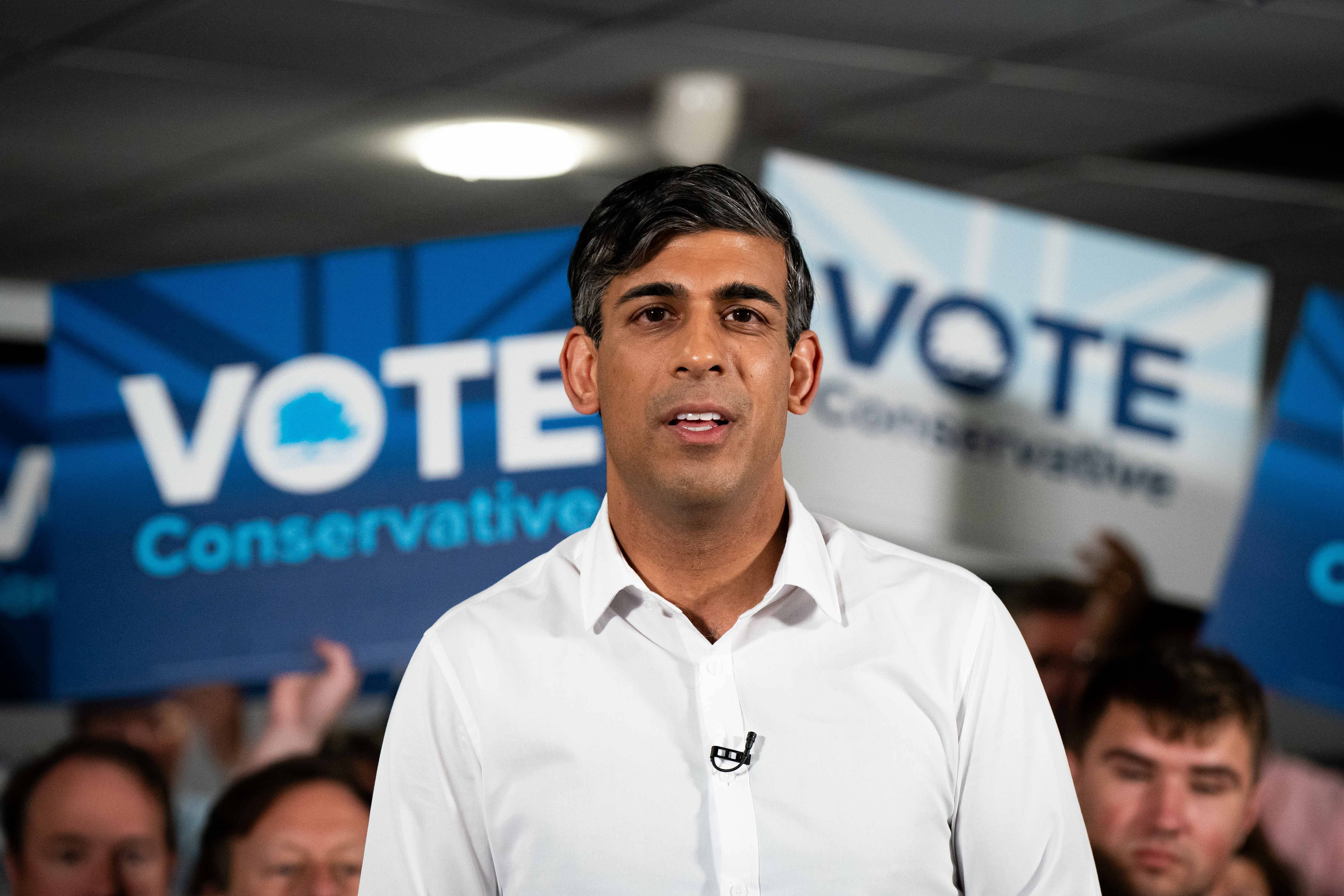Rishi Sunak’s unfunded tax cut for pensioners is a desperate attempt to neutralise the threat of Reform UK
The Conservatives’ pensions ‘triple lock-plus’ – coupled with a plan to bring back national service – is proof of a campaign more focused on defending against Nigel Farage than on taking the fight to Keir Starmer, says John Rentoul


James Carville, Bill Clinton’s campaign manager, once said: “Whenever I hear a campaign talk about a need to energise its base, that’s a campaign that’s going down the toilet.” If he ever wanted an example of a campaign focused on energising its base, the Conservatives’ election strategy of 2024 is it.
Through the drizzle of mistakes and mishaps, it is possible to discern a clear strategy – one of trying to shore up the core Tory vote and to see off the challenge from Nigel Farage’s Reform UK.
Today’s promise of a tax cut for pensioners is the latest policy aimed squarely at the over-65s. It is a small tax cut, worth possibly £300 a year by the end of the next parliament, and it is complicated – a pledge to raise the income-tax personal allowance for pensioners so that anyone relying on a state pension alone won’t be dragged into paying tax.
It was sold to The Daily Telegraph as: “PM: state pensions will never be taxed” – although people’s state pension will still count towards their taxable income for the majority who have other sources of income.
Even if a core-vote strategy was a good idea, this is a poor policy, because it is confusing, and it draws attention to the way Rishi Sunak and Jeremy Hunt have used inflation as a stealth tax, freezing tax thresholds in cash terms, so that more and more of people’s rising incomes are subject to tax.
It is also unfunded, because No 10 claims it will be paid for by “clamping down on tax avoidance”. Clamping down on tax avoidance is a description of the normal activity of HM Revenue and Customs, and if it could produce extra revenue, the question is why it hasn’t been doing so for the past 14 years. When Labour said recently that it would pay for its breakfast clubs by “tackling tax dodgers”, Laura Trott, the Treasury minister, rightly called it “unfunded spending”.
But the Tories are desperate. Internal documents leaked to Bloomberg reveal that party bosses fear that Reform UK could cost them 100 seats. Most of the support for Farage’s party comes from people who would otherwise vote Tory, unlike its predecessor Ukip, which took voters from both main parties roughly equally. And the biggest pool of Tory voters is the over-65s.
Hence the unfunded pensioners’ tax cut, and hence the plan to “bring back national service”, which isn’t a plan to bring back national service, but it sounds a bit like it and therefore appeals to some of the atavistic instincts on the crustier end of the spectrum.
When Margaret Thatcher was prime minister, there were maybe half a dozen really old-fashioned Tory MPs who wanted to “bring back” all sorts of things, including the birch. They were regarded as so far out that they were just harmless eccentrics, but at least they could remember the birch and some of them had even done national service. Today, nobody under the age of 82 can have served – but the pull of folk memory remains strong.
Will it work? I doubt it. Every vote gained from a pensioner grateful for avoiding a small tax rise in three years’ time or who is motivated by bring-backery is likely to be offset by a vote lost from a middle-aged Tory leaner irritated by unfunded and illiberal promises. Meanwhile, the smell of desperation saps the party’s morale.
Voters leaning towards Reform are more likely to be persuaded by the argument that a vote for Reform is a vote for Keir Starmer, which is (a) true, and (b) what Farage probably believes himself – after all, he stood down half his Brexit Party candidates at the last election because he didn’t want to let Labour in.
But many Reform voters are so upset by immigration that they just want to punish the Tories, and a trifling pensioners’ tax cut and a half-baked compulsory volunteering scheme are unlikely to tempt them back.
No doubt the Tory core-vote strategy is part of a grand plan for the election campaign, in which the Conservatives spend the first few weeks shoring up their own base, before turning to face Labour on the centre ground as polling day approaches.
But by then, as James Carville puts it, the Tory campaign will have gone down the toilet.
Join our commenting forum
Join thought-provoking conversations, follow other Independent readers and see their replies
Comments
Bookmark popover
Removed from bookmarks